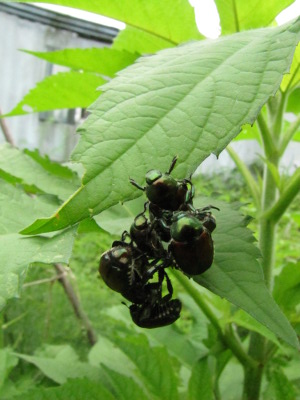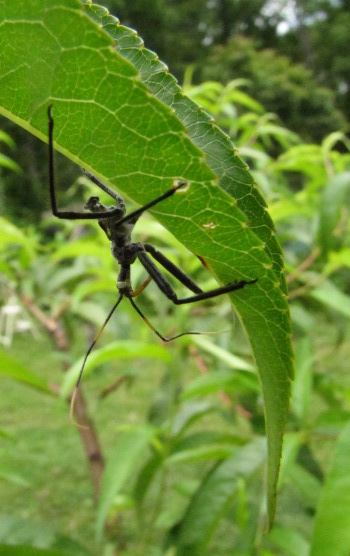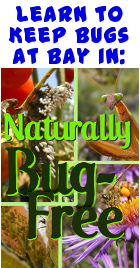
Japanese beetle population boom
 We always have some Japanese
beetles, but they
usually stay on the cherry tree, raspberries, and grapes. This
year, I have to walk through the whole garden picking bugs because the
invasive pests are chowing down on everything from Swiss chard and corn
to breadseed poppies.
We always have some Japanese
beetles, but they
usually stay on the cherry tree, raspberries, and grapes. This
year, I have to walk through the whole garden picking bugs because the
invasive pests are chowing down on everything from Swiss chard and corn
to breadseed poppies.
I can't quite figure out
what tipped the balance to create this shift. Perhaps Mark's been
keeping the lawn mowed too well so the larval stage is happier, or
maybe ripping out those French
grapes deleted my trap crop and spread the insects far and wide? Another option would
be this year's rainy weather since drought can kill Japanese beetles in
the grub stage.
Whatever the cause, I've
been handpicking like crazy and making no dent. I fed a full cup
of Japanese beetles to the chickens on Thursday and immediately saw
more insects that I'd missed. I'd be curious to hear if you're
overrun with more Japanese  beetles than usual this year
or if the plague is confined to my garden.
beetles than usual this year
or if the plague is confined to my garden.
The good news is that
our predatory insects might take up the slack before long. I've
seen hundreds of small praying mantises this year, so hopefully some of
them will rise to the occasion. Meanwhile, I started noticing
assassin bugs hanging out where the Japanese beetles land and even saw
one Japanese beetle husk --- the hard carapace remained but nothing
inside.
I think this guy is,
more specifically, a nymph Wheel Bug (Arilus
cristatus), but
all assasin bugs work pretty much alike. They use those long
mouthparts (see the yellow bit curving down below the insect's face?)
to stab insects and inject a chemical that liquifies the prey's
internal organs. Then the bugs simply suck their dinner
dry. Take that, you Japanese beetles!

Want more in-depth information? Browse through our books.
Or explore more posts by date or by subject.
About us: Anna Hess and Mark Hamilton spent over a decade living self-sufficiently in the mountains of Virginia before moving north to start over from scratch in the foothills of Ohio. They've experimented with permaculture, no-till gardening, trailersteading, home-based microbusinesses and much more, writing about their adventures in both blogs and books.
Want to be notified when new comments are posted on this page? Click on the RSS button after you add a comment to subscribe to the comment feed, or simply check the box beside "email replies to me" while writing your comment.

I suspect that it might be the mowing...but I will have to see how I do this year.
I tend to let our fields grow up a fair bit, and while I have seen many of the beetles in past years, they have stayed to the plants there rather than go after my garden. I THINK they were mostly on the milkweed last year.
All that said, I am about 2 weeks or so behind you, (I am on a mountain in Berkeley Springs, WV), so we will see what issues I have in a bit. (grins)
Geoffrey --- I hope it's not the mowing --- it sure is nice to be able to walk down our garden aisles...
Pat --- I've considered Milky Spore, but our beetles have never been bad enough to make it worthwhile. If this is the trend of the future, though, we're going to have to treat next chance we get (which I understand would be in the spring.)
Rebecca --- Intriguing idea. I'd love it if that were the case! Maybe if we're lucky, next year will be a bad year....
I haven't seen any Japanese Beetles this year but then again they've never been a problem for me yet. I am currently dealing with some cabbage worm moths that I need to buy a butterfly net for.
I hope the assassin bugs and other good guys help you out soon!
Diggitydog --- I'll keep my fingers crossed that they stay away from you. We do pretty well with cabbage moths just by not having crucifers in the garden during their peak flying time. I guess I should really be counting all of the bugs who don't cause us much trouble, not the one who does.
Holly --- You're probably right about the rain. Our summer's been normally rainy lately (which means a few storms a week), but it was seriously wet this spring. Hopefully you'll have a better year next year.